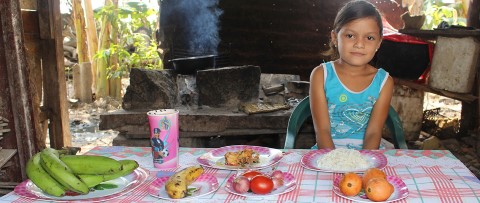- Thought Leadership
How do your eating habits compare to those of our sponsored kids? Take a look at the foods eaten in a typical day by eight of CI’s sponsored children and youth.

Seven-year-old Sharick lives with her grandmother, mother and brother in a home near a horse farm in Barranquilla, Colombia.

The family’s daily meals include mostly fruits: bananas, guavas, tomatoes and melon juice. Chicken wings, rice and onions round out their dinner.

In Guayaquil, Ecuador, breakfast typically includes black coffee or tea and fried plantains and bread.

Soup, like the chicken soup in front of 11-year-old Jordy, is the entrée for lunch. Rice is almost always at the table for lunch and dinner, which may include poultry or fish.

Here, Tennyson, 8, from Lusaka, Zambia, poses with the ingredients needed to make the family’s meals for the day. In the cups are water, black tea and munkoyo, a traditional Zambian home-brewed energy drink.

In the white bowl at center is nshima, a staple food in Zambia made from corn flour and water. Along with cooked okra, beans and chibwabwa (pumpkin leaves), these typical dishes make up the family of four’s entire daily food intake.

Eleven-year-old Lizbeth (far right), her three younger sisters and her mother, Sandra, live in the community of Lloa, about 40 minutes outside of Quito, Ecuador. Sandra typically prepares one meal for the whole day.

In the bowls is morocho, a spiced corn pudding drink. Bagels made from soybeans and tostados (toasted corn nuts) complete their daily meal.
Lizbeth says she loves tostados, as they give her a lot of energy. She sometimes takes the snack to school to share with her classmates and teachers.

Althea, 15, starts her day with bread, coffee with cream and water. Later, the teen in Tabaco, Philippines, snacks on biscuits with more coffee and cream.

Rice is a lunch- and dinnertime staple, accompanied by fish stew and bananas for lunch, and with pako – a vegetable fern – cooked in coconut milk for dinner.

Edwin, 11, shares a cramped room in Quezon City, Philippines, with his five siblings and both parents. As a security guard, his father struggles to make ends meet, so the family typically skips breakfast. If they’re lucky, neighbors provide the children with coffee or bread before school.

Rice and fish crackers are pantry staples. The family also consumes about 2 pounds of low-quality rice a day. At times, they can afford mixed vegetables, cheap instant noodles or a can of sardines. Edwin’s mom says she sometimes skips meals so that her children can eat.

Nine-year-old Poonam, her brother, Kartick, and her parents can afford only two meals a day, which means they must ration lunches to ensure they have enough for dinner. The family lives in Sahay, India.

Breakfast mostly comprises panta bhaat – rice left over from the previous night mixed with water, chopped green chilis, raw onion, salt and a tablespoon of raw mustard oil (in the bottle at the right). Thanks to its affordability, mustard oil is a common ingredient for poor families like Poonam’s, and it is used to cook nearly all vegetables and fish.
Lunch includes rice, grain legumes boiled in water, fried onions and chilis, tomatoes, potatoes and stems of the pumpkin plant – which grows on the family’s roof. For dinner, the family eats leftovers from lunch.

Coffee is Honduras’ biggest export, so it’s no surprise it earns a spot on the table for 13-year-old Stephani, her younger sister and mom.

A typical breakfast in San Pedro Sula is a baleada. Similar to a Mexican taco, baleadas are made with a flour tortilla, beans, cheese, cream, scrambled eggs, sausage and more. Lunch and dinner consist of sweet bread, sausage, ripe plantain slices, chicken soup, tortillas, beans, rice and white cheese.
Reporting and photo assistance by Patricia Calderón, Barranquilla, Colombia; Patricia Huerta, Guayaquil, Ecuador; Audrey Hamayanda, Lusaka, Zambia; Andrés Rosero, Quito, Ecuador; Leo Ganace, Tabaco, Philippines; Carmelinda Carpio, Quezon City, Philippines; Shane Alliew, Kolkata, India; Jesús Almendárez, San Pedro Sula, Honduras
This site uses cookies to improve your experience. You can restrict cookies through your browser; however that may impair site functionality.
Are you sure?